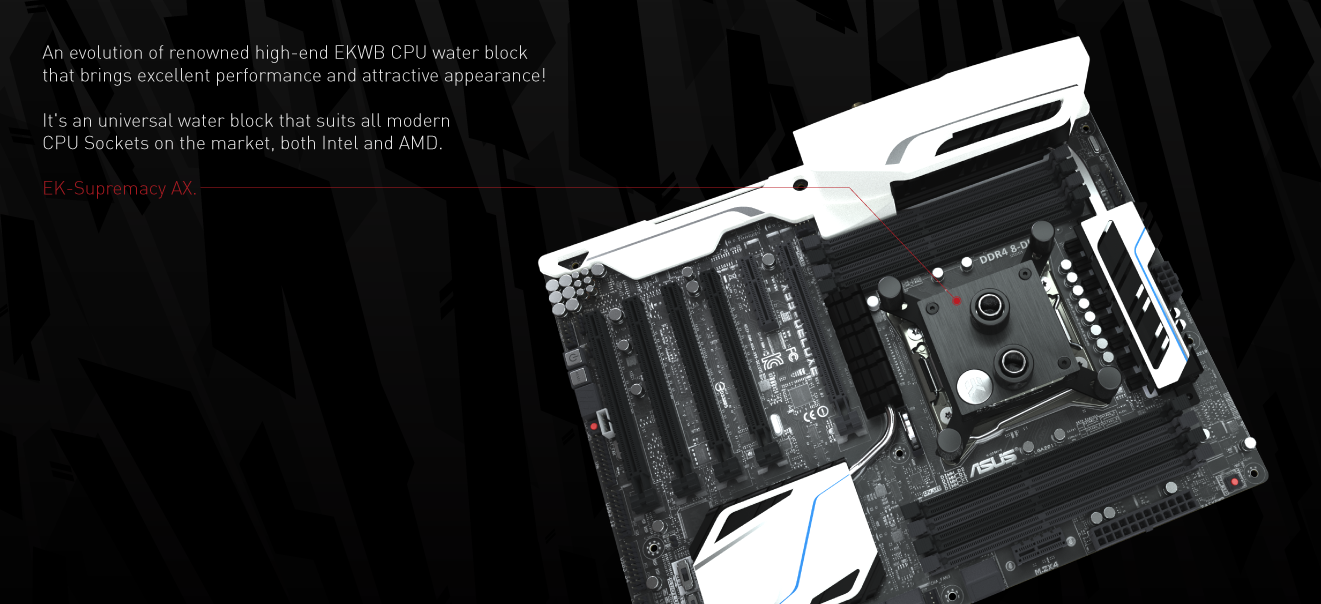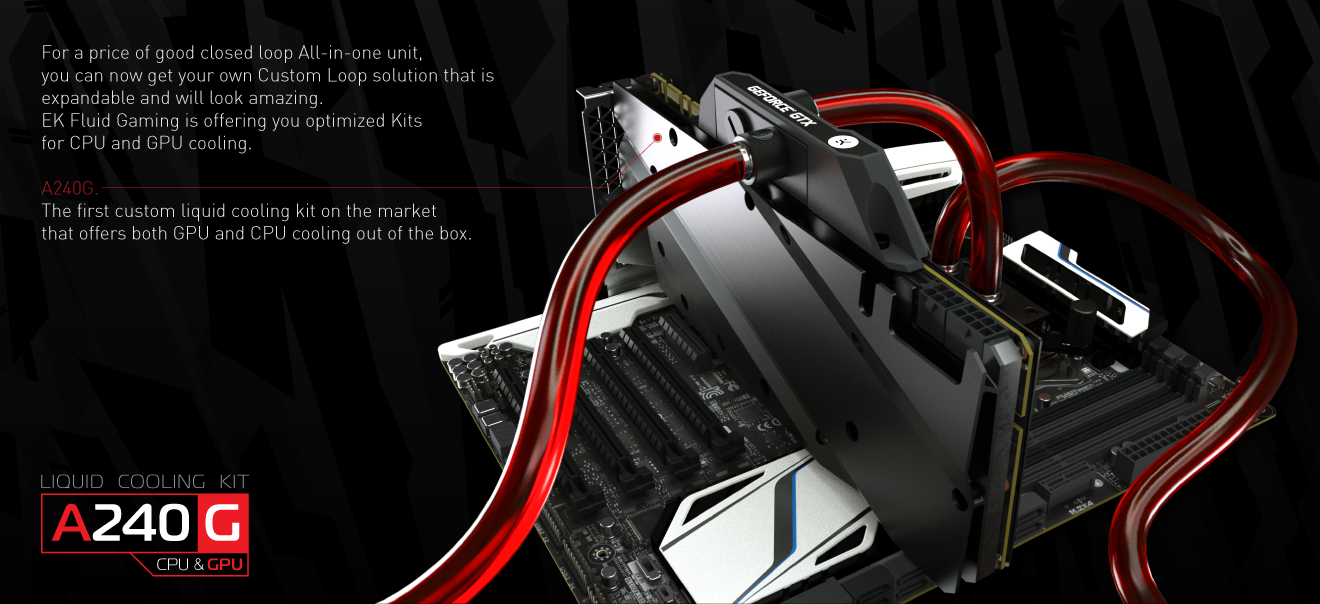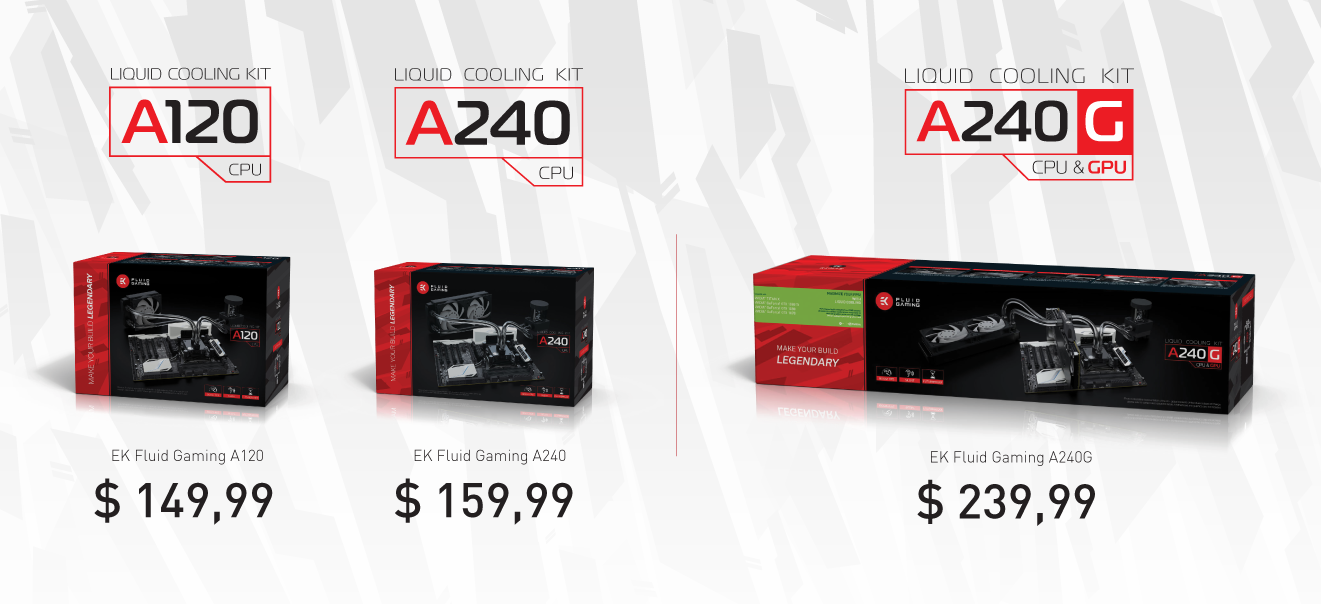EK Water Blocks Bringing Open-Loop Liquid Cooling To The Masses With Fluid Gaming Series
EK Water Blocks revealed the Fluid Gaming series of full loop water cooling kits during Computex. EKWB’s new water cooling lineup offers an affordable way jump into the world of custom water cooling.
EK Water Blocks offers a wide range of water cooling products including reservoirs, radiators, pump tops, fittings, and, of course, water blocks. With its all-encompassing portfolio of water cooling components, the company is also able to offer bundle packages to bring the cost down for newcomers to the water cooling scene. EKWB offers kits that include all the parts you need to build an open loop water cooling setup.
In 2015, EKWB introduced the EK-XLC Predator, which offered the convenience of closed loop coolers and the advantages of open loop systems, at an affordable price. EKWB’s EK-XLC Predator lineup comes pre-filled with coolant from the factory. EKWB also offers pre-filled GPU blocks that you can purchase to expand your loop. The EK-XLC Predator serves as an excellent option if you don’t want the hands-on experience of assembling and filling the loop yourself.
EKWB also offers options for people who do want the hands-on experience but might not know what to look for. EKWB’s open loop kits include the same water cooling components that you would buy individually all in one package; they take the guess work out of selecting components for your loop. Don’t expect to pick one up if you’re on a tight budget, though. EKWB’s boxed water cooling kits range from almost $200 to nearly $400. And that doesn’t include a GPU water block.
EKWB recognized that water cooling would always be a niche market at that price range, so it decided to do something about that. The company revealed the EK Fluid Gamer series of full-loop kits, which are available for as little as $150.
“We believe every gamer should experience the joy of putting together a PC with a full custom liquid cooling solution, said Mark Tanko, EKWB CEO. “Every gamer should enjoy gaming on a silent PC with high FPS and low temps. Every gamer should be able to overclock his gaming PC and see what hardware is really capable of. With EK Fluid Gaming, we are now enabling you to do just that – a legendary liquid cooling solution at a very affordable price.”
Slash The Costs In Half With New Materials
EKWB traditionally uses electrolytic copper to build its water blocks, and more often than not, it opts for nickel-plated copper. The use of high-end materials such as those ensures a high-end product, but they also necessitate top-tier price tags. While designing the Fluid Gaming series, EKWB ditched the copper blocks in exchange for aluminum, which is more affordable and easier to mass produce, which allows the company to keep the MSRP at a minimum.
Get Tom's Hardware's best news and in-depth reviews, straight to your inbox.
EKWB offers the Fluid Gamer series of full loop systems as complete kits, but you can’t buy the parts individually. The company said the new kits are expandable, but you’ll have to wait for new components before you can expand your loop. The Fluid Gamer’s aluminum parts aren’t compatible with the rest of EKWB water cooling lineup. Copper and aluminum don’t like each other; they start to corrode when introduced to the same water cooling loop. EKWB said Fluid Gamer-compatible components would be available in the future to expand and upgrade your loop, but the company is offering only full kits for now.
The Fluid Gaming series kits feature an aluminum EK-Supremacy AX CPU block with a universal mounting system that is compatible with “all modern CPU sockets” from both Intel and AMD. The kits also include 28mm thick EK-AluStream SE radiators to dissipate the heat that your loop picks up. Of course, EKWB’s previous lineup of copper fittings wouldn’t work with the aluminum parts in the package, so the company includes a set of EK-ACF ALU fittings. The Fluid Gaming kits also include EKWB’s SPC series pump with integrated reservoir. The company rounds out the kits with a length of EK-DuraClear transparent tubing and a bottle of clear EK-CryoFuel coolant, which you could dye to any color you prefer.
EKWB is offering the Fluid Gaming series in three different kits. You can pick up the EK Fluid Gaming A120 kit, which features a 120mm radiator and CPU block for $149, or the EK Fluid Gaming A240 kit, which offers a radiator twice the size for $10 more.
EKWB also revealed the EK Fluid Gaming A240G, which includes a universal GeForce GTX 10-series full-cover GPU block that fits all Founder’s Edition 10-series cards, including the Titan X Pascal and the Titan Xp. The aluminum full-cover GPU block features a design that is unique in the EKWB lineup. It doesn't come with a black Acetal top, and you can't get it with a clear acrylic window. The Fluid Gaming series GPU block features a stylized black aluminum faceplate over a solid aluminum cooling block. The aluminum GPU block features EKWB's new terminal block design. The EK Fluid Gaming A240G is available for $239. Most full cover GPU blocks alone cost $120 or more.
For more information about EKWB’s Fluid Gaming water cooling kits, visit the EK Fluid Gaming website.
Kevin Carbotte is a contributing writer for Tom's Hardware who primarily covers VR and AR hardware. He has been writing for us for more than four years.


